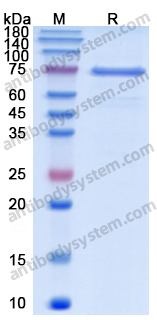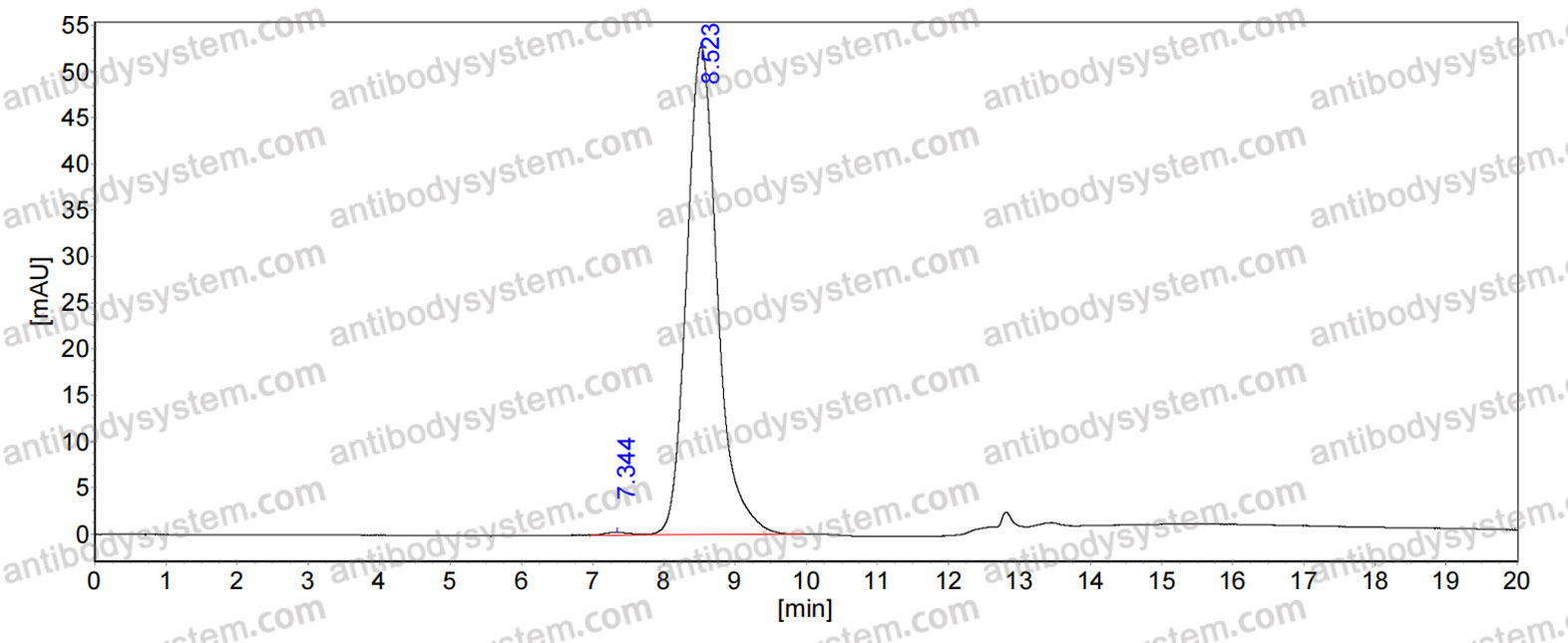Catalog No.
AID00301
Description
Pemphigus vulgaris (PV) is a potentially lethal skin disease in which epidermal blisters occur as the result of the loss of cell-cell adhesion caused by the action of autoantibodies against desmoglein 3.
Expression system
Confidential
Species
Homo sapiens (Human)
Protein length
Confidential
Nature
Recombinant
Endotoxin level
Please contact with the lab for this information.
Purity
>95% as determined by SDS-PAGE.
Accession
P32926
Applications
As a diagnostic tool for Pemphigus vulgaris (PV).
Form
Lyophilized
Storage buffer
Lyophilized from a solution in PBS pH 7.4, 1mM EDTA, 4% Trehalose, 1% Mannitol.
Reconstitution
Reconstitute in sterile water for a stock solution.
Shipping
In general, proteins are provided as lyophilized powder/frozen liquid. They are shipped out with dry ice/blue ice unless customers require otherwise.
Stability and Storage
Use a manual defrost freezer and avoid repeated freeze thaw cycles. Store at 2 to 8°C for frequent use. Store at -20 to -80°C for twelve months from the date of receipt.
Alternative Names
Cadherin family member 6, DSG3, Desmoglein-3, 130 kDa pemphigus vulgaris antigen, PVA, CDHF6
Desmoglein-3 autoantibodies in tissues of oral lichen planus patients and its correlation with disease severity: case-control study., PMID:40481453
Factors associated with persistent anti-desmoglein positivity after remission in pemphigus vulgaris: a prospective registry-based cohort study., PMID:40433384
Epac1 contributes to apremilast-mediated rescue of pemphigus autoantibody-induced loss of keratinocyte adhesion., PMID:40299565
Elevated Fab glycosylation of autoantibodies maintained during B cell depletion therapy., PMID:40295683
[CAR-T cells in Dermatology: Mechanisms of action and applications in autoimmune diseases]., PMID:40279442
Epitomic profiling and functional characteristics of pemphigus vulgaris autoantibody binding to keratinocyte M3 muscarinic acetylcholine receptor., PMID:40120680
Clinical Features, Diagnosis and Treatment of Different Types of Paediatric Pemphigus., PMID:40059466
Molecular Markers of Occult Lymph Node Metastasis in Head and Neck Squamous Cell Carcinoma (HNSCC) Patients., PMID:40018925
Prevalence and pathogenic activity of anti-desmocollin-3 antibodies in patients with pemphigus vulgaris and pemphigus foliaceus., PMID:39989391
Optimizing Pemphigus Management With Rituximab and Short-Term Relapse Predictors., PMID:39908046
The impact of signaling pathways on the desmosome ultrastructure in pemphigus., PMID:39882246
Case report: A rollercoaster journey of pemphigus vegetans., PMID:39872528
Pemphigus relapse: Mechanisms, risk factors, and agents associated with disease recurrence., PMID:39460496
Quality-controlled characterization of a monoclonal antibody specific to an EC5-domain of human desmoglein 3 for pemphigus research., PMID:39450179
IgG reactivity to different desmoglein-3 ectodomains in pemphigus vulgaris: novel panels for assessing disease severity., PMID:39416775
Human dental mesenchymal stem cells restorate immune response in sera of pemphigus vulgaris patients., PMID:39352524
Effect of opioid receptor antagonist on mitigating tumor necrosis factor-like weak inducer of apoptosis (TWEAK)-induced apoptolysis in pemphigus pathogenesis., PMID:39276627
Unbiased screening identifies regulators of cell-cell adhesion and treatment options in pemphigus., PMID:39271654
Comparison of serum cytokines and chemokines levels and clinical significance in patients with pemphigus vulgaris-A retrospective study., PMID:39246287
Standardized Production of Anti-Desmoglein 3 Antibody AK23 for Translational Pemphigus Vulgaris Research., PMID:39169810
Pathogenic relevance of antibodies against desmoglein 3 in patients with oral lichen planus., PMID:39152677
Direct immunofluorescence on plucked hair outer root sheath can predict relapse in pemphigus vulgaris., PMID:39086016
Alteration of reactive oxygen species master transcription factor Nrf2 in keratinocytes exposed to monoclonal pathogenic antibody AK23 against desmoglein-3 in pemphigus vulgaris., PMID:39037929
Mutant TP53 promotes invasion of lung cancer cells by regulating desmoglein 3., PMID:38900156
Factors associated with non-pathogenic antibodies against desmoglein-3 in pemphigus foliaceus., PMID:38851894
The emergence of circulating activated autoreactive desmoglein 3-specific follicular regulatory T cells is associated with long-term efficacy of rituximab in patients with pemphigus vulgaris., PMID:38848544
Absence of Epidermal Antibodies in Stevens-Johnson Syndrome/Toxic Epidermal Necrolysis Patients but Beware of Single Positive Results., PMID:38803350
A case of bullous pemphigoid complicated by mucosal lesions due to mucosal-dominant pemphigus vulgaris: analyzing the pathogenicity of anti-desmoglein 3 antibodies using a bead aggregation assay., PMID:38741281
Desmosomal Hyper-Adhesion Affects Direct Inhibition of Desmoglein Interactions in Pemphigus., PMID:38677661
EGFR Inhibition by Erlotinib Rescues Desmosome Ultrastructure and Keratin Anchorage and Protects against Pemphigus Vulgaris IgG-Induced Acantholysis in Human Epidermis., PMID:38642796
Clinical and immunological predictors of post-rituximab paradoxical pemphigus flare: A prospective cohort study., PMID:38595008
Differences among Indian and European pemphigus patients based on demographics, clinical parameters and propensity for relapse: results of a prospective bicontinental cohort study., PMID:38465545
Rituximab in the Management of Autoimmune Bullous Diseases: A Treatment-Resistant Case Series from a Single Central European Referral Center., PMID:38399557
ERK/MEK Pathway Regulates Th17 Cell Differentiation in Patients with Pemphigus Vulgaris., PMID:38371571
Aspirin-exacerbated respiratory disease is associated with variants in filaggrin, epithelial integrity, and cellular interactions., PMID:38317805
Sustained Remission Without Corticosteroids Among Patients With Pemphigus Who Had Rituximab as First-Line Therapy: Follow-Up of the Ritux 3 Trial., PMID:38265821
JNK inhibition enhances cell-cell adhesion impaired by desmoglein 3 gene disruption in keratinocytes., PMID:38227055
Novel nanoparticle AuNCs conjugated with Desmoglein-3 antibody for FL/CT dual-mode targeted imaging and precise treatment of lung squamous cell carcinoma., PMID:38224630
A case of anti-laminin γ1 (p200) pemphigoid developed after dipeptidyl peptidase-4 inhibitor administration., PMID:38214494
Pemphigus vulgaris relapsed with serological shift from single-positive desmoglein-3 antibodies to single-positive desmoglein-1 antibodies., PMID:38212901
A case of paraneoplastic pemphigus associated with follicular lymphoma positive only for anti-desmoglein 3 antibody., PMID:38111329
Bioinformatics analysis of human kallikrein 5 (KLK5) expression in metaplastic triple-negative breast cancer., PMID:38090381
Comparative Transcriptome Analysis Identifies Desmoglein-3 as a Potential Oncogene in Oral Cancer Cells., PMID:38067138
Ferroptosis-related genes prognostic signature for pancreatic cancer and immune infiltration: potential biomarkers for predicting overall survival., PMID:38007403
Treatment with a red-laser-based wound therapy device exerts positive effects in models of delayed keratinocyte and fibroblast wound healing., PMID:37957888
Tacrolimus reverses pemphigus vulgaris serum-induced depletion of desmoglein in HaCaT cells via inhibition of heat shock protein 27 phosphorylation., PMID:37940861
Homozygous deletion of the DSG3 terminal exon associated with acantholytic blistering of the oral and laryngeal mucosa., PMID:37850634
Thalidomide Alleviates Apoptosis, Oxidative Damage and Inflammation Induced by Pemphigus Vulgaris IgG in HaCat Cells and Neonatal Mice Through MyD88., PMID:37719363
Type 2 T-Cell Responses against Distinct Epitopes of the Desmoglein 3 Ectodomain in Pemphigus Vulgaris., PMID:37717934
Serologic Biomarkers in Pemphigus Monitoring: C-reactive Protein, Macrophage Migration Inhibitory Factor, and Prolactin Levels Versus Autoantibody Assays., PMID:37524667


